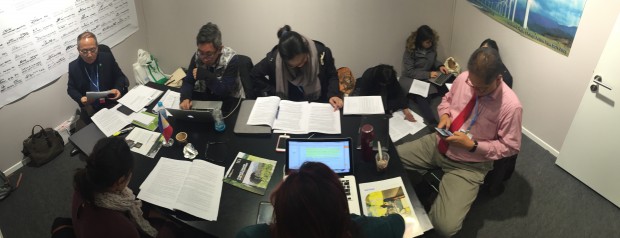
The Philippine delegation goes over the latest 12-page draft Paris agreement as COP21 enters its second midnight session in Paris, France. PHOTO BY SARA PACIA/INQUIRER.NET
PARIS – On the second midnight session of the 21st Conference of Parties (COP21), the Philippine delegation said it was prepared to reiterate its positions on “red-line” issues still contentious at the next Indaba, dubbed by the conference presidency as an “Indaba of Solutions.”
“The instructions… is to look at whether the text is acceptable overall based on our positions to whether red lines of ours are crossed,” said Dean Tony La Viña, spokesperson of the Philippine delegation, who defined red lines as areas in the current draft Paris agreement where the Philippines is not willing to compromise.
He said that the article on loss and damage, in particular, is a “double red line” for the Philippines. Under the current draft, loss and damage due to the adverse effects of climate change cannot be used as a basis for liability or compensation from developed countries.
“It’s a challenging thing because we don’t want a Paris agreement without the loss and damage mechanism,” La Viña said. “But we cannot have a loss and damage system that absolutely excludes the possibility of compensation and liability. That’s a trap.”
READ: PH to battle it out for climate goals
The latest 12-page draft Paris outcome was released during the fifth Comite de Paris (Committee of Paris) at 9 p.m on Dec. 10. The Indaba of Solutions, scheduled for 12:30 a.m. on Dec. 11, Paris time (7:30 a.m. in the Philippines), would entertain only party statements on “solutions of compromise,” according to French Foreign Minister Laurent Fabius, COP21 president.
An indaba is a format of engagement originating from South Africa wherein leaders are given equal opportunity to voice their opinions in order to work toward a consensus.
Other red lines include the current text on a target increase of global average temperatures to “well below 2 degree Celsius above pre-industrial levels,” which La Viña described as “still lacking,” as well as the possibility of excluding human rights from the preamble and the lack of clear climate financing with set figures.
However, although the Philippine delegation would prefer stronger language in terms of the 1.5 degree Celsius target, La Viña said they were willing to work through the current wording after a bilateral meeting earlier in the day with Saudi Arabia, which has publicly opposed most of the terms of the proposed legally binding agreement.
“We discussed 1.5 and agreed to work together to a compromise language like this,” he said.
Secretary Manny de Guzman, head of the Philippine delegation, and La Viña are expected to sit at the Indaba of Solutions.
Earlier at the Comite de Paris, Fabius expressed hope that an agreement would be reached by the end of COP21, which was originally slated to end on Dec. 11, 2015.
“I think, dear friends, that we will make it,” he said. “What is now important is to seek landing zones and to seek compromise.” RAM
RELARED STORY
PH delegation opens all doors to media, NGOs as COP21 nears end